- Home
- Gayle Forman
Just One Day 02: Just One Year Page 16
Just One Day 02: Just One Year Read online
Page 16
“Can you keep looking? See if any seats open up?”
“Certainly! Will do.”
I hang up and try to fight off the sense of impending doom. I’d thought the film would keep me here a few extra days, all of them in a hotel. Now I’m stuck. I remind myself that I don’t need to stay in Mumbai past the shoot. Nash and Tasha and Jules are going to Goa for a few days if they can cobble the cash together. Maybe I’ll go with them. Maybe I’ll even pay.
I send Jules a text: Is Goa still a go?
She texts back: Only if I don’t kill N&T. Last night unbearably loud. You are a traitor for deserting.
I look around my hotel room where last night it was unbearably quiet. I take a shot of the view from the balcony and send it to Jules. It’s quiet here. And there’s room for two if you want to desert, I write.
I like dessert, she texts back. Tell me where you are.
A few hours later, there’s a knock at the door. I open it and Jules comes in. She admires the view and hops on the bed. She picks up the script from the coffee table.
“Want to run lines?” I ask. “There’s English translations.”
She smiles. “Sure.”
I show her where to start. She clears her throat and arranges her face. “And who do you think you are?” she asks in a haughty voice, her attempt, I think, to mimic Amisha.
“Sometimes I wonder,” I reply. “The name on my birth certificate reads Lars Von Gelder. But I know who you are, Heera Gopal. Heera, it means diamond, doesn’t it? And you glitter as brightly as your name.”
“I don’t care to discuss my name with you, Mr. Von Gelder.”
“Oh, so you know me after all?”
“I know all I care to.”
“Then you know I am the top exporter of diamonds in South Africa, so I know a thing or two about precious gems. I can see more with my naked eye than most jewelers can with a loupe. And looking at you, I can tell that you are a million carats. And flawless.”
“Word has it that you’re after my family’s diamond, Mr. Von Gelder.”
“Oh, I am, Miss Gopal. I am.” I pause for a beat. “But perhaps not the Shakti Diamond.”
At the end of the section, Jules puts down the script. “This is quite cheesy, Mr. Van Gelder.”
“It’s Von Gelder, actually.”
“Oh. Sorry. Mr. Von Gelder.”
“It’s very important, you know? Names,” I say.
“Oh, yeah? What’s Jules short for?”
“Juliana?” I try. “Like the Dutch queen?”
“Nope.” Jules stands up from her chair and walks toward me, smiling as she folds herself into my lap. Then she kisses me.
“Juliet,” I try.
She shakes her head, smiling as she unbuttons her shirt. “Not Juliet. But you’re welcome to be my Romeo tonight.”
Twenty-nine
* * *
The next morning, Jules leaves, back to Pune and the ashram with Nash and Tasha. We make vague plans to meet up in Goa the following week. I never do find out what Jules is short for.
I feel hungover even though we didn’t drink, and lonely even though I’m used to being on my own. I call Prateek to see what he’s doing this weekend, but he’s helping his mother at home today and tomorrow he is going to a big family dinner with his uncle. I spend the day wandering Juhu Beach. I watch a bunch of men play soccer on the sand and it all makes me miss the boys in Utrecht. And then all the missing congeals, and it’s Lulu I miss, and I know it must be displaced, my loneliness a heat-seeking missile, her the heat. Only I can’t seem to find a new source of heat. I don’t miss Jules at all.
• • •
• • •
By Sunday, I’m going stir-crazy. I decide to take a train out of the city, a day trip somewhere. I’ve just opened my guidebook to figure out where to go when my phone rings. I practically leap on it.
“Willem!” Mukesh’s jovial voice echoes through the line. I don’t think I’ve ever been happier to hear from him. “What are you doing today?”
“I’m just trying to suss that out. I was thinking of making a day trip to Khandala.”
“Khandala is very nice, but far for one day so you must leave early. If you like, I can arrange a driver for you another day. I have a different proposal for you. How about I take you around?”
“Really?”
“Yes. There are some very lovely temples in Mumbai, smaller temples tourists so rarely see. My wife and daughters are away, so I have the day free.”
I gratefully accept, and at noon, Mukesh picks me up in a small battered Ford and proceeds to speed me around Mumbai. We stop at three different temples, watching young men do yoga-like calisthenics, watching old Sadhus meditating in prayer. The third stop is a Jain temple, the acolytes all hold small brooms sweeping in front of them as they walk. “To brush any living creatures out of their way so not to inadvertently take a life,” Mukesh explains. “Such care for life,” he says. “Just like Mummy.”
“Right. Mummy is practically a Jain,” I say. “Or maybe she’s aiming to be the next Mother Teresa?”
Mukesh gives me a sympathetic look that makes me want to break something. “You know how I met Mummy, do you not?” he asks as we walk through a breezeway in the temple.
“I assume it had something to do with the fascinating world of air travel.” I’m being unfair to Mukesh, but such is the price for making himself her emissary.
He shakes his head. “That came later. I was with my own mummy who had the cancer.” He clucks his tongue. “She was having her treatments, tip-top doctor, but it was in the lungs, so not much to be done. We were coming from the specialist one day, waiting for a taxi, but Amma, that’s my mummy, was quite weak and dizzy and she fell on the street. Your mummy happened to be nearby and she rushed up to ask if she could help. I explained to her about Amma’s condition—it was terminal,” he lowers his voice to a whisper. “But your mummy told me about different things that could help, not to cure her, but to make the dizziness and the weakness better. And she came, every week, to my home, with her needles and her massages and it helped so much. When my amma’s time came, her journey to the next life was so much more peaceful. Thanks to your mummy.”
I see what he’s doing. Mukesh is attempting to interpret my mother to me much in the way Bram used to do when he’d explain why Yael seemed so gruff or distant. He was the one to quietly tell me stories about Saba, who, after the death of Yael’s mother, Naomi, came undone by one tragedy too many. He turned overprotective, paranoid, or more overprotective and paranoid, Bram said, not allowing Yael to do the simplest things—swim in a public pool, have a friend over—and forcing her to keep disaster preparation checklists for any kind of emergency. “She promised she would do everything differently,” he said. “So it would be different for you. So it wouldn’t be oppressive.”
As if there’s only one kind of oppressive.
• • •
• • •
After the temples, we have lunch. I’m feeling bad about how I acted toward Mukesh, so when he tells me he has something extra special he wants to show me—something very few tourists ever see—I paste on my smile and act excited. As we bump across Mumbai, the streets becomes more dense: bicycles, rickshaws, cars, donkey-pulled carts, cows, women with bundles on their heads, all converge onto choked streets that don’t seem built for such traffic. The buildings themselves suffer from the same syndrome; the mix of high-rises and shacks are all overflowing with rivers of people, sleeping on mats, hanging laundry on lines, cooking on small fires outside.
We turn down a dank narrow alley, shrouded somehow from the bright sunlight. Mukesh points to the row of young girls in tattered saris, standing. “Prostitutes,” he says.
At the end of the alley we stop. I look back at the prostitutes. Some are younger than me, and their eyes look blank, an
d it all makes me feel ashamed somehow. Mukesh points to a squat cement building with a name written on it in both swirly Hindi and block English. “Here we are,” he says.
I read the sign. mitali. It’s vaguely familiar.
“What is this?” I ask.
“Why, Mummy’s clinic, of course,” he says.
“Yael’s clinic?” I ask in alarm.
“Yes, I thought we might pay her a visit.”
“But, but . . .” I sputter for excuses. “It’s Sunday,” I finish, as if the day of the week is the problem.
“Sickness does not take a Sabbath.” Mukesh points to a small teashop on the corner. “I will wait for you there.” And then he’s gone.
I stand in front of the clinic for a minute. One of the prostitutes—she looks no older than thirteen—starts to walk toward me and I can’t stand the thought that she thinks I’m a client, so I shove open the door to the clinic. The door swings open, right onto an old woman crouched just inside. There are people everywhere, with homemade bandages, and listless babies, napping on pallets on the floor. They’re camped all up the cement stairs and all around the waiting room, giving new meaning to the term.
“Are you Willem?” From behind the glass partition a no-nonsense Indian woman in a lab coat is looking at me. Two seconds later, she opens the door to the waiting room. I feel all the eyes turn to me. The woman says something in Hindi or Marathi and there is much silent nodding, giving new meaning to the term patient, too.
“I’m Doctor Gupta,” she says, her voice brisk, efficient but warm. “I work with your mother. Let me go find her. Would you like some tea?”
“No thank you.” I have the sickening feeling that everyone else is in on a joke but me.
“Good, good. Wait here.”
She leads me to a small windowless room with a ripped gurney, and a rush of memory overtakes me. The last time I was in a hospital: Paris. The time before that: Amsterdam. Yael had called me at my dorm, very early that morning, telling me to come. Bram was sick.
I couldn’t understand the urgency. I’d seen him not a week before. He’d been a little off his game, a sore throat, but Yael was tending to him with her usual teas and tinctures. I had an exam that day. I asked if I could come after.
“Come now,” she said.
At the hospital, Yael had stood in the corner while three doctors—the traditional kind, with stethoscopes and guarded expressions—surrounded me in a grim little circle and explained to me that Bram had contracted a rare strain of strep that had sent his body into septic shock. His kidneys had already failed and now his liver was going, too. They were doing everything they could, putting him on dialysis and pumping him full of the most powerful antibiotics, but so far, nothing had been effective. I should brace myself for the worst.
“I don’t understand,” I said.
Neither did they, really. All they could say was, “It’s one of those one-in-a-million cases.” Such comforting odds, except when you were the one.
It was like finding out the world was made of gossamer and could be so easily ripped apart. To be so solely at the mercy of fate. Even with all Bram’s talk of accidents, it seemed inconceivable.
I looked to Yael, mighty Yael, to intervene, to swoop in, to take care of Bram like she always had. But she just shrank into that corner, not saying a word.
“Do something, goddammit!” I screamed at her. “You have to do something.”
But she didn’t. Couldn’t. And two days later, Bram was gone.
• • •
• • •
“Willem.”
I turn around and there’s Yael. I always think she’s so frightening, but she’s actually tiny, barely reaching my shoulder.
“You’re crying,” she says.
I reach out and touch my face and I find it wet with tears. I’m mortified to be doing this. In front of her. I turn away. I want to run. Out of this clinic. Out of India. Forget the shoot. Forget the flight delay. Buy a new ticket. It doesn’t have to be back to Amsterdam. Anywhere that’s not here.
I feel her hands on me, turning me back around. “Willem?” she asks. “Tell me why you’re lost.”
It’s shocking to hear her words, my words. That she remembered.
But how can I answer her? How can I answer when I’ve been nothing but lost these last three years? So much more than I ever anticipated. I keep thinking of another one of the stories Bram used to tell, a horror story really, about when Yael was a girl. She was ten and Saba had taken her camping in the desert. Just the two of them. As the sun started to set, Saba said he’d be right back, and then left her alone with one of those disaster preparation checklists that he was always having her make. Yael, terrified, but capable because of those very disaster preparation checklists, made a fire, made dinner, made camp, fended. When Saba showed up the next day, she screamed at him, How could you leave me alone? And Saba had said, I wasn’t leaving you alone. I was watching the whole time. I was preparing you.
Why didn’t she prepare me? Why didn’t she teach me about the universal law of equilibrium before I had to find it out for myself? Maybe then I wouldn’t miss everything so much.
“I miss . . .” I start to say, but I can’t get the words out.
“You miss Bram,” she says.
And yes, of course I do. I miss my father. I miss my grandfather. I miss my home. And I miss my mother. But the thing is, for almost three years, I managed not to miss any of them. And then I spent that one day with that one girl. One day. One day of watching the rise and fall of her sleep under the rolling clouds in that park and feeling so peaceful that I fell asleep myself. One day of being under her protection—I can still feel the grasp of her hand as we flew through the streets after she threw the book at the skinheads, her grip so strong that it felt like we were one person, not two. One day of being the beneficiary of her strange generosity—the barge ride, the watch, that honesty, her willingness to show fear, her willingness to show courage. It was like she gave me her whole self, and somehow as a result, I gave her more of myself than I even realized there was to give. But then she was gone. And only after I’d been filled up by her, by that day, did I understand how empty I really was.
Yael watches me a moment longer. “Who else do you miss?” she asks, like she already knows the answer.
“I don’t know,” I say, and for a minute she looks frustrated, like I’m keeping it from her, but that’s not it, and I don’t want to keep things from her anymore. So I clarify. “I don’t know her name.”
Yael looks up, surprised, and not. “Whose name?”
“Lulu.”
“Isn’t that her name?”
So I tell my mother. About finding this girl, this strange and nameless girl, whom I showed nothing but who saw everything. I tell her how since losing her, I have felt bereft. And the relief at telling my mother this is almost as profound as the relief of finding Lulu was.
When I finish telling Yael the story about that day in Paris, I look at her. And I’m shocked all over again because she’s doing something I’ve only seen her do in the kitchen while cutting onions.
My mother is crying.
“Why are you crying?” I ask her, now crying again myself.
“Because it sounds just like how I met Bram,” she says, laughing on a sob.
Of course it does. I’ve thought about that every single day since I met Lulu. Wondered if that’s not why I’m stuck on her. Because the story is so much like Yael and Bram’s.
“Except for one thing,” I say.
“What’s that?” she asks, swiping at her eyes.
The most important detail. And you’d think I would’ve known better, having heard Bram’s story so many times.
“You give the girl your address.”
Thirty
* * *
APRIL
Mumbai
* * *
As Mukesh expected, the shoot goes over schedule by double, so for six days I have the pleasure of becoming Lars Von Gelder. And it is. A pleasure. A surprising one. On set, in costume, with Amisha and the other actors across from me, Lars Von Gelder’s cheesy Hindi lines cease to feel cheesy. They don’t even feel like another language. They roll off my tongue and I feel like I am him, the calculating operator who says one thing and wants another.
In between takes, I hang out in Amisha’s trailer, playing games of hearts with her and Billy. “We’re all impressed with your abilities,” Amisha tells me. “Even Faruk, though he’ll never say so.”
He doesn’t. Not exactly. But at the end of each day, he pats me on the back and says, “Not bad, Mr. Not Really.” And I feel proud.
But then it’s the last day and I know it’s over, because instead of saying “not bad,” Faruk says “good work,” and thanks me.
And that’s it. Next week, Amisha and the principles are packing for Abu Dhabi where they will shoot the final scenes of the film. And me? Yesterday I got a text from Tasha. She and Nash and Jules are in Goa. I’m invited to go with them. But I won’t.
I have a couple more weeks here. And I’m spending them with my mother.
My first night back at the Bombay Royale, I get in late. Chaudhary is snoring behind the desk, so I take the stairs up to the fifth floor rather than wake him. Yael has left the door propped open, but she’s also asleep when I get in. I’m both relieved and disappointed. We haven’t really spoken since that day at the clinic. I don’t quite know what to expect between us. Have things changed? Do we speak a common language now?
The next morning she shakes me awake.
“Hey,” I say, blinking my eyes.
“Hey,” she says back, almost shyly. “I wanted to know, before I leave for work, if you wanted to join me tonight for a Seder. It’s the first night of Passover.”
I almost think she’s joking. When I was growing up, we only celebrated the secular holidays. New Year’s. Queen’s Day. We never once had a Seder. I didn’t even know what they were until Saba started visiting and told me about all the holidays he celebrated, that Yael used to celebrate when she was a child.

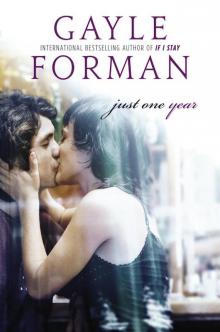 Just One Year
Just One Year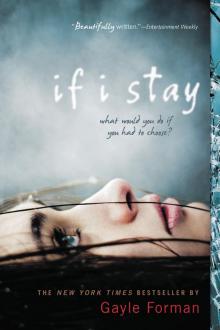 If I Stay
If I Stay Where She Went
Where She Went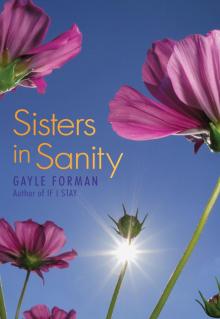 Sisters in Sanity
Sisters in Sanity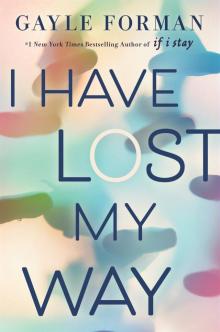 I Have Lost My Way
I Have Lost My Way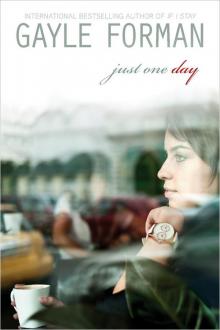 Just One Day
Just One Day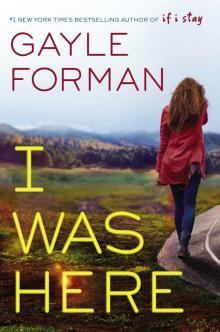 I Was Here
I Was Here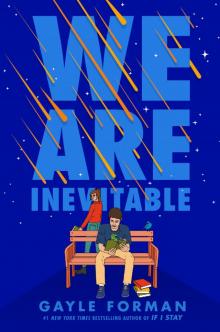 We Are Inevitable
We Are Inevitable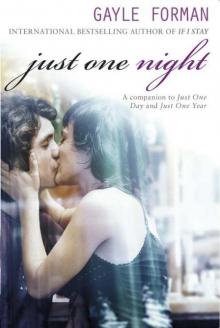 Just One Night
Just One Night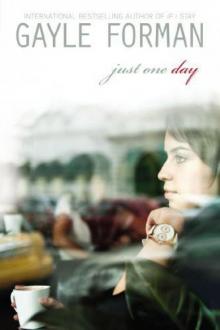 Just One Day jod-1
Just One Day jod-1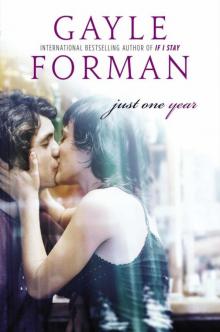 Just One Day 02: Just One Year
Just One Day 02: Just One Year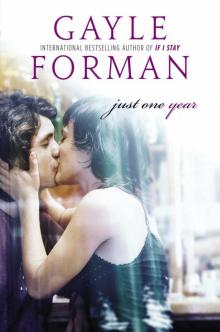 Just One Year jod-2
Just One Year jod-2